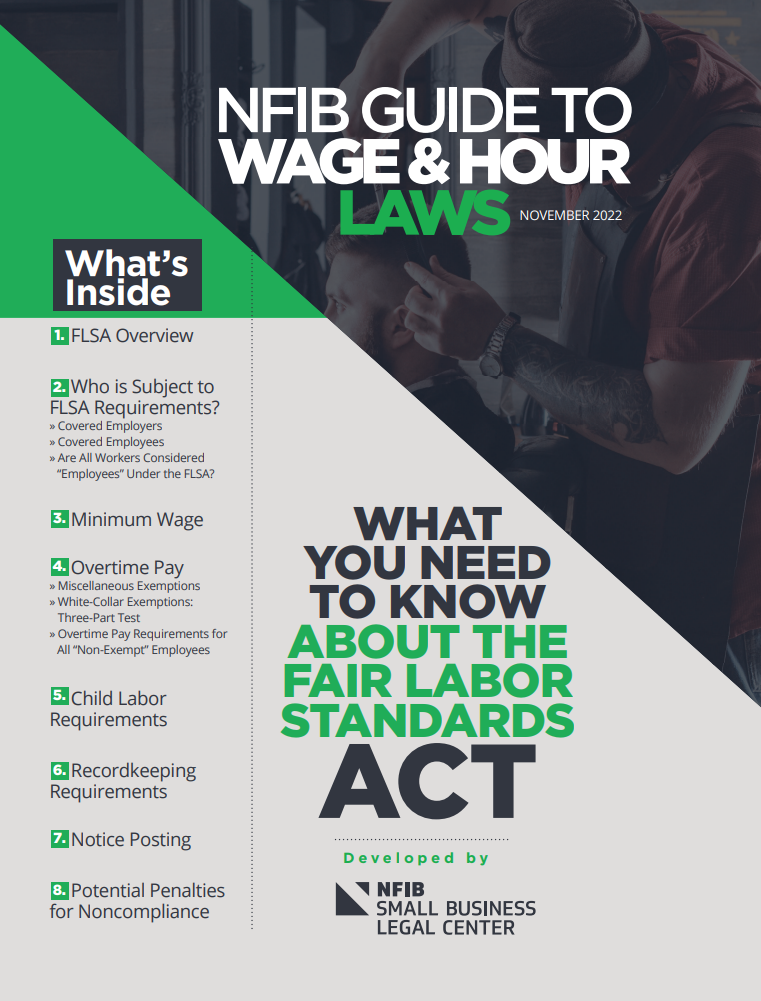Topics:
November 16, 2022
NFIB webinar explains independent contractor classification, overtime calculation, exemptions, and more
What Small Business Owners Need to Know About Federal Wage & Hour Laws
 Small business owners regularly encounter wage and hour laws, a complex and often-misunderstood area of employment law. To help small businesses navigate this problematic area of the law, NFIB Small Business Legal Center Executive Director Beth Milito hosted a webinar focused on key wage and hour laws and how to stay in compliance with them.
Beth highlighted the NFIB Small Business Legal Center’s newly updated Wage and Hour Guide, which goes in-depth about issues related to independent contractor status and Federal Labor Standards Act (FLSA) compliance. “The guide is written in a way that I hope will be helpful for small businesses,” Beth said. “I know many small businesses do not have a dedicated human resource person to handle employment law, so we’re hopeful that the guide will help in those matters.”
Beth added that part of the Legal Center’s motivation to update the guide came from recent changes in the wage and hour laws across the US. “It’s a complex area of law that’s becoming more complex. Unfortunately, more and more states and local municipalities are enacting their own wage and hour laws layered on top of the federal law.” Beth added that the Biden administration has aggressively tried to crack down on wage and hour violations, with the Department of Labor home page boasting that they took 24,700 compliance actions affecting over 190,000 workers in 2021.
“Getting wage and hour laws wrong is expensive. Small violations can be multiplied over a large number of people, so even a minor infraction could turn into huge fines. It’s better to get it right the first time than try to clean up mistakes afterwards.”
First, Beth discussed how to determine whether a worker is an independent contractor. Independent contractors are not considered employees, so they are not covered by the various employment, labor, and tax laws. “Unfortunately, there is no single test,” Beth said. “Different labor departments have different tests, and the IRS has their own test too, believe it or not.” She went on to list the three main criteria for independent contractor status:
Small business owners regularly encounter wage and hour laws, a complex and often-misunderstood area of employment law. To help small businesses navigate this problematic area of the law, NFIB Small Business Legal Center Executive Director Beth Milito hosted a webinar focused on key wage and hour laws and how to stay in compliance with them.
Beth highlighted the NFIB Small Business Legal Center’s newly updated Wage and Hour Guide, which goes in-depth about issues related to independent contractor status and Federal Labor Standards Act (FLSA) compliance. “The guide is written in a way that I hope will be helpful for small businesses,” Beth said. “I know many small businesses do not have a dedicated human resource person to handle employment law, so we’re hopeful that the guide will help in those matters.”
Beth added that part of the Legal Center’s motivation to update the guide came from recent changes in the wage and hour laws across the US. “It’s a complex area of law that’s becoming more complex. Unfortunately, more and more states and local municipalities are enacting their own wage and hour laws layered on top of the federal law.” Beth added that the Biden administration has aggressively tried to crack down on wage and hour violations, with the Department of Labor home page boasting that they took 24,700 compliance actions affecting over 190,000 workers in 2021.
“Getting wage and hour laws wrong is expensive. Small violations can be multiplied over a large number of people, so even a minor infraction could turn into huge fines. It’s better to get it right the first time than try to clean up mistakes afterwards.”
First, Beth discussed how to determine whether a worker is an independent contractor. Independent contractors are not considered employees, so they are not covered by the various employment, labor, and tax laws. “Unfortunately, there is no single test,” Beth said. “Different labor departments have different tests, and the IRS has their own test too, believe it or not.” She went on to list the three main criteria for independent contractor status:
- Behavioral Control: Does the company control what the worker does and how the worker does their job?
- Financial Control: Are the business aspects of the worker’s job controlled by the payer? (e.g., are their expenses reimbursed, do they provide their own tools/supplies, etc.)
- Relationship of the Parties: Is there a written contract or employee type benefits to the worker?
Get to know NFIB
NFIB is a member-driven organization advocating on behalf of small and independent businesses nationwide.
Related Articles

July 3, 2025
NFIB Thanks Congress for Passing Landmark Small Business Tax Re…
NFIB applauds Congress for passing the One Big Beautiful Bill Act, which in…
Read More


July 3, 2025
Hawaii Comment on Latest NFIB Jobs Report
One of the intangibles small-business owners have always asked for is consi…
Read More


July 3, 2025
Alaska Comment on Latest NFIB Jobs Report
With compliance of Ballot Measure 1 underway, running a business just got t…
Read More


July 3, 2025
Washington Comment on Latest NFIB Jobs Report
If future ones are any better, it won’t be because of anything happening…
Read More







